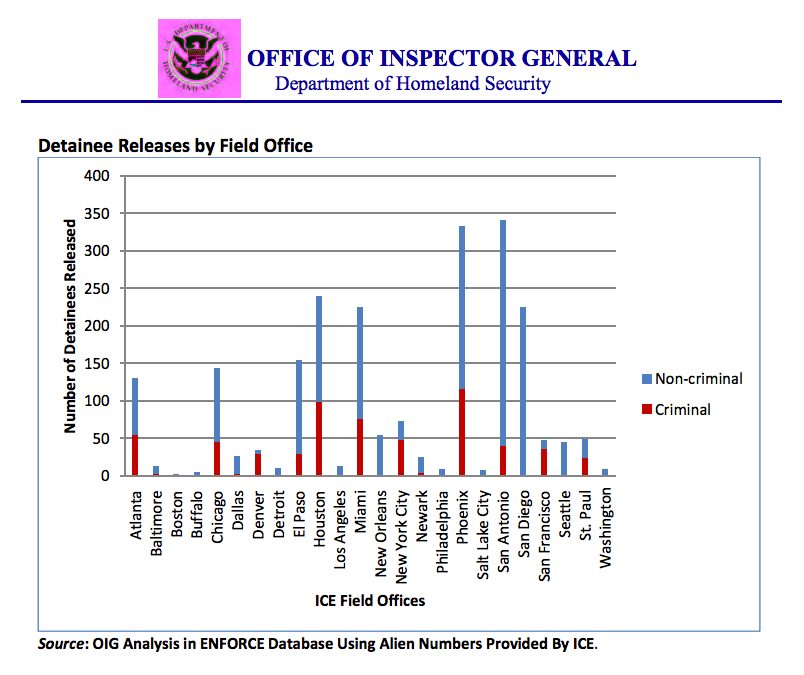Obama Administration Released Over 600 Illegal Immigrants With Criminal Convictions
Published on August 12th, 2014
Sharyl Attkisson
August 12, 2014
The Daily Signal
More than 600 convicted criminals, including felons, were among thousands of illegal immigrants freed under the Obama administration in advance of 2013 budget cuts mandated under sequestration.
That’s according to a new report today from the inspector general for the Department of Homeland Security.
The Obama administration released 2,226 immigrant detainees, 617 of whom had criminal convictions.
According to the IG’s report, at least two-dozen “aliens” were released by Immigration and Customs Enforcement even though they were in a “mandatory detention category.” (After an internal review, ICE later redetained them.)
The report provides a scathing portrayal of budget mismanagement and flawed processes at the highest levels inside the nation’s immigration enforcement agency.
 |
| During the three weeks leading up to sequestration, from Feb. 9 to March 1, ICE released 2,226 immigrant detainees, including more than 600 with criminal convictions. (Photo: Keith Myers/Kansas City Star/MCT/Newscom) |
Politically Motivated Decisions?
The atmosphere leading up to sequestration in early 2013 was politically charged. President Obama claimed the automatic budget cuts would hurt the economy, health care and emergency responders, and that federal prosecutors would have to “let criminals go.”
Republicans accused the administration of trying to create the appearance of a crisis by making high-profile cuts they claimed were unnecessary, such as halting White House public tours and mass-releasing illegal immigrants.
During the three weeks leading up to sequestration, from Feb. 9 to March 1, ICE released 2,226 immigrant detainees—617 of whom had criminal convictions. Approximately 1,450 were freed the last weekend before sequestration. The field offices that released the most criminal convicts include Phoenix, Houston, Atlanta and Chicago.
 |
|
Chart: Inspector General for the Department of Homeland Security Report, p. 37 |
‘Sharp and Immediate Reduction’
It was Radha Sekar, ICE’s chief financial Officer, who decided on the “sharp and immediate reduction in detention bed space,” according to the IG. The report did not describe other officials or processes involved in approving and implementing Sekar’s decision.
The IG said that in the months prior to sequestration, ICE officials responsible for enforcement and removing aliens repeatedly asked Sekar for information on available funding but did not receive it. ICE was strapped by a stark increase in illegal immigrant apprehensions and had not developed contingency plans to address its budget shortfall.
“The publicized releases occurred the weekend before sequestration … generating speculation that the releases were improperly [politically] motivated.”
About a week before sequestration, Sekhar notified the White House Office of Management and Budget of ICE’s funding problem and requested $22 million. But ICE inexplicably moved forward with the mass releases without waiting to hear whether the White House would provide the requested funds that would make the releases unnecessary.
“We were not able to determine why ICE executive leadership did not wait for OMB to make a decision on releasing additional funding,” stated the IG report.
Further, ICE’s instructions to release illegal immigrants over a weekend meant tax dollars were spent to pay overtime for field officers and, in 23 out of 24 field offices, it meant ICE attorneys did not have the opportunity to review cases before release.
 |
| After the Associated Press reported in March 2013 that the Obama administration had released more than 2,000 immigrants over a three-week period, Homeland Security Chief Janet Napolitano said the story was ‘not really accurate.’ (Photo: James Tourtellotte/Creative Commons) |
Misinformation Provided to Congress and the Public
When the media and Congress began asking questions about the controversial releases in February and March of 2013, the IG says ICE executive leadership rushed answers and, in doing so, gave “inaccurate” information to Congress and the public.
In March 2013, when the Associated Press reported the administration had released more than 2,000 immigrants over a three-week period, Homeland Security Chief Janet Napolitano stated the AP story was “not really accurate” and that it had developed “its own mythology.”
“Several hundred [releases] are related to sequester, but it wasn’t thousands,” Napolitano stated incorrectly on March 4, 2013.
Housing an average 34,000 illegal immigrant detainees costs the U.S. $122 per bed, a total of $4.15 million a day, for an annual cost of $1.5 billion.
Nine days later, ICE director John Morton testified to Congress that his agency had, indeed, “released 2,228 aliens” (later revised to 2,226).
“We were trying to live within the budget that Congress had provided us,” Morton said, denying any political motivations. “This was not a White House call. I take full responsibility.”
That much appears to be true. Today’s IG report states, “We obtained no evidence ICE sought or received guidance about the timing or nature of the detainee budgetary releases from [Napolitano] or the Executive Office of the President.”
Moreover, according to the report, ICE attorneys reviewed the releases and concluded the agency made reasonable decisions given the short time frame.
 |
|
President Obama claimed that federal prosecutors would have to ‘let criminals go’ because of budget cuts. (Photo: Mandel Ngan/Newscom) |
Problems Persist
Despite the debacle, the IG has determined:
- ICE still has no effective strategy to manage its detention budget.
- ICE’s ability to track expenditures and available funding has not improved.
- ICE has not improved communication or transparency with key stakeholders.
Homeland Security officials told the IG they still have difficulty obtaining sufficient information from Sekar to conduct adequate oversight, even though ICE falls under Homeland Security’s supervision.
“ICE must develop a transparent budget process, delegate detention management functions to field offices, and engage Congress to fund detention bed space fully with multiple year or no year appropriations,” concluded the IG.
 |
| Sens. Tom Coburn, R-Okla., and John McCain, R-Ariz., requested the IG review. (Photo: Pete Marovich/ZUMAPRESS.com/Newscom) |





